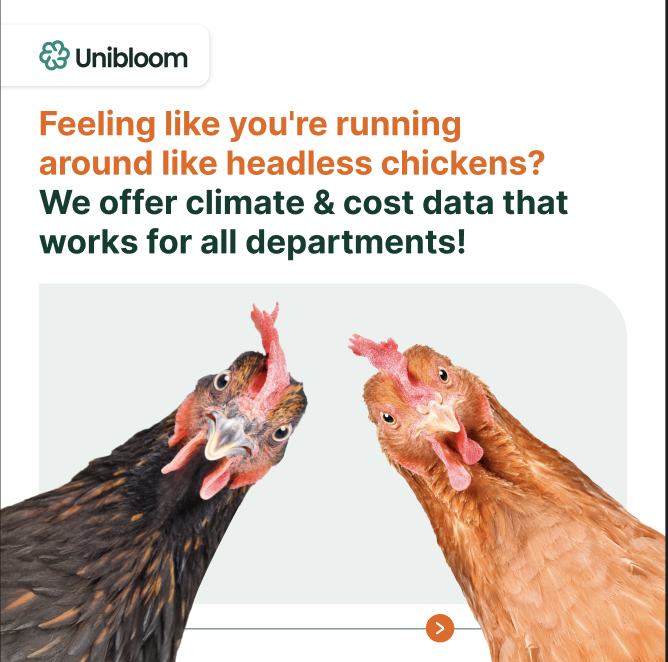The 2025 Opportunity: Driving financially viable climate actions in food, agriculture & consumer goods companies

The 2025 Opportunity: Driving financially viable climate decisions & actions
As 2025 unfolds, companies in food, agriculture, consumer goods, and fashion face mounting pressure to deliver on climate commitments, business growth and profitability. These industries, responsible for over 50% of global emissions, 70% of freshwater use, and 50% of habitable land use, are at the epicenter of environmental challenges. Yet, 43% more budget is being spent on sustainability reporting than on sustainable innovation, a stark imbalance that hinders meaningful progress.
The result? A vicious cycle of more reporting and less action, where businesses are bogged down in compliance rather than building innovative, actionable pathways to reduce emissions. This imbalance not only wastes resources but leaves companies vulnerable to regulatory risks, reputational damage, and rising operational costs due to inaction.
At the same time, the regulatory landscape—shaped by CSRD, ISSB, and EUDR—demands comprehensive climate transition plans & shift in ingredients/feed/materials, energy, packaging and transportation that go beyond reporting. Companies must now prove progress through scenario simulations for risks and opportunities, all while aligning with Science-Based Targets (SBTi) and demonstrating ROI on climate initiatives. The old tools—spreadsheets, emails, and siloed systems—simply cannot handle this complexity.
The problem: Why current approaches aren’t working
1. Imbalanced spending on reporting vs. innovation
- 43% more budget is spent on sustainability reporting than on sustainable innovation, leaving teams with limited resources to drive action.
- Reporting requirements are crucial, but they’re meaningless without actionable, measurable progress integrated in business investments & decisions
2. Fragmented and manual processes
- Businesses are stuck using outdated tools like spreadsheets, emails, and PowerPoint decks, creating inefficiencies, errors, and delays.
- Emissions factors are inaccurate and inconsistent, even within the same company, making it difficult to compare solutions or measure real impact.
3. Disconnected value chains
- Companies struggle to track and reduce Scope 3 emissions, which account for the majority of their environmental impact.
- Suppliers and customers remain siloed, preventing collaborative solutions across the value chain.
- Capture the right emission factors from suppliers are insufficient, slow and not useful for decision making.
4. Financial misalignment
- Most companies fail to link climate actions to financial outcomes & business growth, leaving leadership teams unconvinced of the ROI on sustainability investments.
Unibloom’s solution: Turning reporting into action
Unibloom is here to transform how businesses approach climate decisions and action, shifting the focus from compliance-driven reporting to innovation-driven results. With a proven track record of helping companies like ScandiStandard, Unilever, and GoodPop, and partnerships with carbon accounting providers and energy leaders, we empower businesses to make climate action faster, cheaper, and more collaborative through automation, integration and digitisation.
1. Driving collaborative solutions across value chains
- Enable suppliers and customers to collaborate on emission reduction strategies with shared scenarios and predictive insights.
- Standardise calculations and create a single source of truth, improving trust and transparency across teams.
2. Delivering predictive and financially aligned insights
- Provide advanced scenario simulations that integrate emissions, costs, nutrition and business growth opportunities.
- Show clear ROI on climate initiatives, helping financial teams align sustainability goals with profitability.
3. Integrating across teams and systems
- Replace outdated tools with a centralised forward-looking tool that connects sustainability, innovation, procurement, and financial teams.
- Ensure all teams work from the same data, streamlining decision-making and eliminating silos.
4. Automating compliance and reporting
- Automate CSRD, ISSB, GHG calculations and SBTi frameworks for compliance workflows, ensuring accuracy of the data needed and saving weeks of manual effort.
- Reduce reporting costs, freeing up budgets for innovation and impactful actions.
The vision: From reporting to actionable insights & results
Unibloom’s mission is to help 1,000+ companies move beyond compliance-driven reporting to deliver financially viable climate actions, cost-effectively. Our platform is designed to:
1. Align climate actions with financial goals
- Link emissions reductions to ROI, ensuring sustainability initiatives are both impactful and profitable.
- Build a clear business case for climate action, fostering leadership buy-in and long-term growth.
2. Shift resources to innovation
- Free up budgets for sustainable innovation by reducing the cost and complexity of compliance.
- Empower teams to focus on measurable progress, not just meeting regulatory requirements.
3. Unlock collaboration across value chains
- Facilitate shared action between suppliers and customers to tackle Scope 3 emissions.
- Enable integrated decision-making that aligns with both business goals and regulatory requirements.
Proven expertise and results
Unibloom is led by a team of industry experts with deep experience in sustainability, data=bases, modelling and digital transformation, including leaders from Unilever, Ben & Jerry’s, eBay, and Bloomberg. Our platform has already delivered measurable results for leading companies:
- ScandiStandard: Using Unibloom to optimise the climate reduction plan, feed strategies and collaborate with suppliers on Scope 3 reductions.
- Unilever: Partnering on advanced scenario modeling to align climate goals with business growth in the pork industry.
- GoodPop: Supporting BCorp-certified initiatives to enhance transparency and impact in juice sourcing & transportation.
Why act now?
- Regulatory deadlines are here
- Companies must comply with CSRD, EURD and ISSB requirements, including scenario simulations and transparent climate transition plans.
- The cost of inaction is rising
- Failure to act could lead to $4 trillion in global economic losses by 2030, alongside reputational damage and regulatory penalties.
- Innovation drives competitiveness
- Companies that integrate climate actions with financial outcomes will gain a competitive edge, attracting customers, investors, and top talent.
The Unibloom vision
Our vision is simple yet ambitious: to empower 1,000+ food, agriculture, fashion & consumer goods companies to make climate actions faster, cheaper, and more collaborative—turning sustainability from a cost centre into a growth driver.
By automating calculations, integrating data-bases of emission factors, nutrition and costs across the value chains, and delivering predictive insights meeting regulations and risks, Unibloom helps businesses:
- Achieve compliance while reducing costs.
- Accelerate Scope 3 reductions and operational efficiencies.
- Demonstrate ROI and unlock subsidies for sustainable initiatives.
2025 is the year to move beyond fragmented solutions and embrace a platform built for action, not just reporting. Together, let’s create a future where climate decisions drive growth, resilience, and meaningful impact.
Anna Sandgren
CEO, Unibloom
Book a first intro: calendly.com/anna-sandgren or anna.sandgren@unibloom.world




